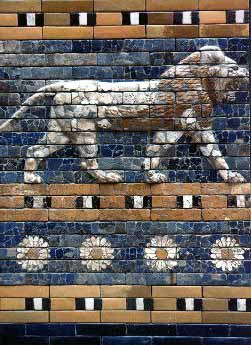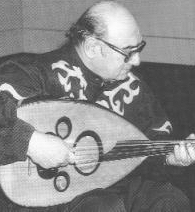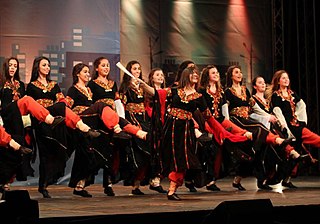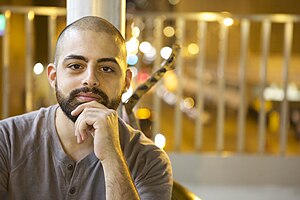
The music of Iraq or Iraqi music,, also known as the music of Mesopotamia, encompasses the music of a number of ethnic groups and musical genres. Ethnically, it includes Mesopotamian Arabic, Assyrian, Kurdish and the music of Turkmen, among others. Apart from the traditional music of these peoples, Iraqi music includes contemporary music styles such as pop, rock, soul and urban contemporary.
Arabic music is the music of the Arab world with all its diverse music styles and genres. Arabic countries have many rich and varied styles of music and also many linguistic dialects, with each country and region having their own traditional music.
Sephardic music is an umbrella term used to refer to the music of the Sephardic Jewish community. Sephardic Jews have a diverse repertoire the origins of which center primarily around the Mediterranean basin. In the secular tradition, material is usually sung in dialects of Judeo-Spanish, though other languages including Hebrew, Turkish, Greek, and other local languages of the Sephardic diaspora are widely used. Sephardim maintain geographically unique liturgical and para-liturgical traditions.
The music of Lebanon has a long history. Beirut, the capital city of Lebanon, has long been known, especially in a period immediately following World War II, for its art and intellectualism. Several singers emerged in this period, among the most famous Fairuz, Sabah, Wadih El Safi, Nasri Shamseddine, Melhem Barakat, Majida El Roumi, Ahmad Kaabour, Marcel Khalife, and Ziad Rahbani, who—in addition to being an engaged singer-songwriter and music composer—was also a popular playwright. Lydia Canaan was hailed by the media as the first rock star of the Middle East.
Regarding the music of Syria, there are certain musical traditions and practices that have been present in Syria longer than others. There have been musical influences introduced into Syria through multiple eras of conquest and influences from surrounding cultures in modern-day Syria. Lying in the Middle East, and connected to southern Europe by the Mediterranean, Syria became host to many distinct cultural musics through trade and route. The music present in Syria is related greatly to poetry, influenced greatly by the Bedouin nomadic tribes, the maqam system in Arabic classical music, as well as influenced greatly by the geopolitical movement and conflict in the Middle East. Syrian music generally has a singer who is accompanied by three or four instruments. The texture is usually thin but can become denser depending on the use of each instrument. Music is tightly linked to poetry in Syria.

Munir Bashir was an Iraqi-Assyrian oudist. Bashir is considered one of the foremost virtuosos of the Arabic oud, and is widely renowned as one of the most important figures in 20th century Middle Eastern music.
The various nations of the region include the Arabic-speaking countries of the Middle East, the Iranian traditions of Persia, the Jewish music of Israel and the diaspora, Armenian music. Azeri Music, the varied traditions of Cypriot music, the Turkish music of Turkey, traditional Assyrian music, Coptic ritual music in Egypt as well as other genres of Egyptian music in general. It is widely regarded that some Middle-Eastern musical styles have influenced Central Asia, as well as the Balkans and Spain.

Ravinia Festival is an outdoor music venue in Highland Park, Illinois. It hosts a series of outdoor concerts and performances every summer from June to September. The first orchestra to perform at Ravinia Festival was the New York Philharmonic under Walter Damrosch on June 17, 1905, with the Chicago Tribune praising its "musical entertainment so satisfying in quality and so delightful in environment." It has been the summer home of the Chicago Symphony Orchestra (CSO) since 1936. Located in the Ravinia neighborhood, the venue operates on the grounds of the 36-acre (15 ha) Ravinia Park, with a variety of outdoor and indoor performing arts facilities, including the architectural prairie style Martin Theater. The Ravinia Festival attracts about 600,000 listeners to some 120 to 150 events that span all genres from classical music to jazz to music theater over each three-month summer season.

Fareed Haque is an American jazz guitarist, based in Chicago, Illinois.

Dabke is a Levantine folk dance, particularly popular among Lebanese, Jordanian, Palestinian, Arab Israelis and Syrian communities. Dabke combines circle dance and line dancing and is widely performed at weddings and other joyous occasions. The line forms from right to left and the leader of the dabke heads the line, alternating between facing the audience and the other dancers.

Anouar Brahem is a Tunisian oud player and composer. He is widely acclaimed as an innovator in his field. Performing primarily for a jazz audience, he combines Arabic classical music, folk music and jazz and has been recording since at least 1991, after becoming prominent in his own country in the late 1980s.

Yair Dalal is an Israeli musician of Iraqi-Jewish descent.
Amir ElSaffar is an American jazz trumpeter and vocalist. His compositions combine jazz, classical, and traditional Arabic music.

Omar Bashir is an Iraqi-Hungarian musician. He is the son of Munir Bashir, who is widely considered to be one of the most important virtuosos in the history of the oud and a master of the modal tradition of Arabic maqam.

Farid and Rami Chehade, who perform professionally as the Chehade Brothers, are Palestinian–Lebanese musicians and singers.

Mohsen Subhi was a Palestinian composer of classical Arabic music and an arranger of modern Palestinian music and folk song.
Issa Boulos is a Palestinian-American Oud player, composer, lyricist, researcher and educator. Born in Jerusalem into a Christian family known for both music and literary traditions, his talent became evident at an early age, and was singing Arab classical maqam repertoire by age 7. He enrolled in the Institute of Fine Arts in Ramallah at age 13 and studied Oud with Abu Raw`hi 'Ibaidu.

Ramzi Aburedwan is a Palestinian composer, arranger, educator; and viola and buzuq player. He is the founder of Ensemble Dal’Ouna and the Palestine National Ensemble of Arabic Music. He founded the al Kamandjâti music centre and has collaborated with international and renowned musicians. He first studied at the Edward Said National Conservatory of Music and then in the Regional Conservatory of Angers (France). Documentaries have been made of his life, including Its Not a Gun (2005) and Just Play (2012). He is the main subject of the book Children of the Stone: The Power of Music in a Hard Land by Sandy Tolan (2015).

Driss El Maloumi is a Moroccan composer and performer on the oud, the Arabic short-necked lute. He is mainly known for playing solo or in trio formations under his own name, for his long-standing cooperation with Catalan musician and musical director Jordi Savall, as well as for being a member of the group 3MA, comprising three popular African string instrumentalists.
Issam Rafea, also written Essam Rafea, is a Syrian musician, music director and composer, noted for his compositions and performances on the Arabic oud, as former director of the Syrian National Orchestra for Arabic Music and for his collaboration with jazz and world music bands. Since 2013, Rafea has lived in Chicago, touring in the US as well as internationally.












